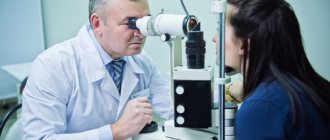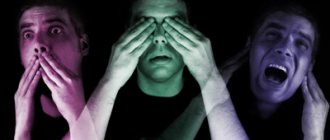What is postpartum psychosis, what are its clinical manifestations.
What treatment is needed in this case? Postpartum psychosis is defined in the International Classification of Diseases, Tenth Revision, as “Mental and behavioral disorders in the first six weeks after childbirth.” This acute condition occurs between two and six weeks postnatally (after childbirth).
Disorders of mental processes in women associated with pregnancy and childbirth were described by the ancient Greek physician Hippocrates, who called this condition “delirium” or “mania.” Then the phrase “birth fever” was used.
Symptoms of postpartum psychosis
Symptoms range from depression with apathy and guilt to gross disturbances of perception in the form of illusions and hallucinations, thinking disorders in the form of obsessive, overvalued and delusional thoughts. Postpartum psychosis is usually preceded by a period of disturbed sleep and anxiety.
Fear may seem justified at the beginning (concern for the child’s health, doubts about proper nutrition), but as the painful condition develops, it becomes absurd and completely covers the sick person.
In a state of psychosis, dangerous aggressive behavior may occur. Therefore, it is very important to consult a psychiatrist at the first signs of postpartum psychosis, or even if you suspect its development.
In the vast majority of cases, postpartum psychoses are completely reversed.
What to do?
If one of your relatives or friends has such a situation in their family, you need to take action as soon as possible. Only with the help of decisive measures can the young mother and her family return to normal life. What needs to be done for a woman to get out of this state with minimal losses for herself and others, including the child?
Consult a doctor
This needs to be done first. Very often, the occurrence of psychosis is associated precisely with the state of a woman’s physical health. Therefore, the sooner treatment is started, the higher the likelihood that the mother will return to a normal, fulfilling life.
So, the first thing you need to do is see a psychiatrist. The doctor will prescribe treatment and, together with the therapist, will monitor its progress. If the need arises, he will prescribe drugs that remove the psychotic state, as well as, if necessary, drugs that will help the woman make her behavior more orderly and less dangerous for her and others.
Postpartum psychosis occurs on average in 0.1-1.2% of women who give birth. In 40-45% of cases, this is due to a mental illness of the mother, but more often the cause is associated with an unfavorable birth, the severe physical and psychological condition of the woman. One of the most common types of postpartum psychosis is postpartum depression.
If it turns out that a woman’s physical condition is at risk, then the doctors’ efforts will be aimed at improving it. If the woman's physical or mental condition is severe, hospitalization may be required. Since a woman may not be aware of her problem, she cannot be expected to see a doctor herself. Her relatives should contact a specialist by inviting a doctor home or convincing the woman of the need for a consultation in a hospital. At the same time, it is possible that for the benefit of the young mother there will be a need to come up with some plausible reason for communicating with a psychiatrist.
Special mention should be made about the attitude towards psychiatrists. It is only in our country that a visit to this doctor is considered an indelible stain for life; In all civilized countries, visiting any doctor, including a psychiatrist, is a normal occurrence. If a person is sick, then he needs to seek help, and specifically from the appropriate specialist. Therefore, it is not worth risking the health and future of a young mother because of the prejudices of past decades.
Provide care for mother and child
If a young mother behaves inappropriately with her child, it is very important to first isolate her from him. It is necessary, for example, to hire an experienced nanny or leave the child in the care of a grandmother. In other words, there must be a person with the child who can provide him with proper care.
One of the family members should spend significant time with the mother: communicate with her, support her, distract her from painful thoughts, or, if she is up to something bad, prevent her from committing violence against herself. If such an attempt was made at least once, you need to immediately consult a doctor - call an emergency psychiatric team. It is very dangerous for a woman to be at home in this state, especially with a child.
If the mother is receiving antipsychotics (medicines that relieve psychosis), then the baby cannot be breastfed at this time. The medicine accumulates in breast milk in dangerous doses and can negatively affect the baby’s health.
Support from loved ones
In any case, wherever a woman is - at home or in the hospital - these days she especially needs the support of people close to her. It has been proven that if there were close people who took care of the young mother and psychologically supported her during the “acute” period, women came out of psychosis faster and easier than those who had no one to support.
The risk of postpartum psychosis is highest after the first birth; with subsequent pregnancies, the risk of this complication decreases.
Therefore, support her, console her when she cries, talk to her about the future, about how good it will be when she feels better. If it seems to you that she is talking about something that actually does not exist (for example, if she believes that they want to poison her child, take her away from her), do not try to dissuade her from this. Otherwise, a woman can only confirm her opinion and such statements will continue longer.
Psychotherapy
Psychotherapy and working with a psychologist are also very useful for these women. The only condition: in order for this to benefit the young mother, a psychotherapist needs to be involved only after the “acute” condition has passed and the doctor believes that the time for such work has already come.
To prevent postpartum psychosis, the physical and psychological preparation of a woman for childbirth is important. Research by doctors has shown that in cases where such preparation for motherhood was carried out during pregnancy, any mental disorders occurred much less frequently than in cases where it was not carried out.
Sometimes it is useful to combine the work of a specialist who will work individually with the mother, and a family psychotherapist who “works” with the whole family. This can help other family members understand what is happening to the new mother and learn to communicate with each other and with her so that her condition does not worsen in the future.
For the woman herself, working with a psychologist is really very important. Indeed, as she begins to recover, to “come to her senses,” she begins to feel guilty before her child: because of her illness, she could not be with him at a time when he especially needed her. A psychotherapist can help a young mother understand her feelings, direct them in a positive direction, help the woman get used to her new role - the role of a mother and become a really good mother for her baby.
Where and how is postpartum psychosis treated?
Treatment of postpartum psychosis includes drug therapy, psychotherapy, physical therapy and restorative procedures.
An important role in the treatment of postpartum psychosis is played by isolation from external stimuli, normalization of hormonal levels, restoration of nutrition and sleep patterns.
Newly occurring and not severe postpartum psychoses can be treated at home (outpatient). If symptoms are severe, hospitalization in a hospital will be required for a period of several days to a month.
If psychosis occurs with aggressive behavior, loss of a critical attitude towards one’s condition, then one has to resort to involuntary hospitalization (in accordance with the law of the Russian Federation). The sick person can be hospitalized in a state psychiatric hospital or in a private psychiatric clinic.
Treatment of postpartum psychosis in a private clinic is more comfortable and often takes place in a shorter time.
Main etiological factors
The economic situation remains in first place in terms of importance of the reasons provoking such violations. Financial problems associated with both pregnancy (expensive examinations, medications) and the upcoming birth seriously affect the mental state. Living conditions are also of great importance (lack of own housing, the need to live with relatives with whom the relationship is not very good).
Also the cause of mental disorder can be:
- sudden changes in hormonal levels (estrogen, cortisol, thyroid hormone) and other biologically active substances
(serotonin, endorphins); - family history of mental illness;
- the presence of depression, psychosis, neurasthenia or diagnosed mental disorders in a woman already at the time of pregnancy;
- unsuccessful pregnancy, in which not only already diagnosed developmental pathologies in the fetus are important, but also doctors’ forecasts regarding congenital disorders (especially if the doctor is not particularly tactful when delivering bad news);
- unwanted child;
- psychotrauma during pregnancy (divorce from husband, death of loved ones, etc.);
- complications during childbirth;
- lack of psychological support;
- miscarriage or intrauterine fetal death during a previous pregnancy;
- neuroinfections, organic brain lesions.
The psychotype of the woman herself also plays an important role. Suspicious, emotional individuals who usually exaggerate existing problems are prone to the development of postpartum psychosis. Risk factors also include depressive episodes, hysterical psychoses, panic attacks, a history of suicide attempts, alcoholism, and drug addiction.
Alcohol psychosis: symptoms, treatment
Alcoholic psychosis occurs due to damage to brain cells by toxic products. Typical symptoms include hallucinatory and delusional symptoms. Treatment for psychosis should be started immediately.
Psychoses in this disease have an acute and chronic course. Acute psychosis (delirium) develops in patients who already have physical dependence on ethyl alcohol. It begins after a sudden cessation of alcoholism. The patient may look like this:
- alarmed, confused;
- motorically disinhibited;
- can't sleep;
- does not understand where he is;
- hallucinates.
Visual images that bother the patient often take on the appearance of animals. The content of hallucinations determines his behavior, forces him to run away, defend himself, and commit strange acts. In severe cases, the patient cannot even get up and makes movements within the bed (fidgeting, saying incoherent things, groping around). This condition indicates severe brain damage. Without help, the patient may die.
Alcoholic paranoid and alcoholic hallucinosis occur acutely or chronically.
Paranoid occurs during the abstinence stage or against the background of abuse. Psychotic symptoms are represented by:
- ideas of jealousy (for example, in relation to a partner);
- ideas of relationships;
- ideas of persecution.
Alcoholic hallucinosis manifests itself in the form of auditory deceptions of perception. The patient hears voices that:
- localized in external space;
- “tell” him some information;
- comment on behavior;
- threaten with violence;
- ordered to perform certain actions.
People around may notice how the patient listens to something, answers, then tries to run away and hide. These experiences are perceived by him as real. Without timely treatment for psychosis, the patient may harm himself.
Alcoholic delusions of jealousy manifest themselves in the patient’s pathological conviction that his partner is cheating on him. The condition is accompanied by outbursts of anger, depressed mood, and demands to admit infidelity. Often such patients arrange surveillance. The course is often chronic. Alcoholic paranoid is characterized by delusions of persecution associated with the immediate environment. The patient notices the surveillance and fears impending reprisals.
Treatment of alcoholic psychosis is carried out in a hospital setting, it includes:
- detoxification of the body;
- drug correction of psychotic disorders;
- examination, treatment of concomitant diseases;
- working with a psychologist, psychotherapist;
- rehabilitation of patients.
After discharge, patients continue to participate in the rehabilitation program, developing a commitment to sobriety. Attempts to cope with psychosis with the help of folk recipes and “conspiracies” are not only ineffective, but also dangerous: a person can die or become disabled. To receive an anonymous consultation with a narcologist, just contact the clinic: 24 hours a day, seven days a week. The specialist will tell you what help will be effective in this situation.
Prevention
For women at high risk of postpartum psychosis, your doctor may suggest the following options: Start taking antipsychotic medications in the last trimester of pregnancy, immediately after giving birth, or when the first signs of psychosis appear. If there is a high risk, it makes sense to find a doctor in advance with whom you can be in touch throughout the postpartum period, a clinic in case there is a need for hospitalization, think in advance who can help at first and who will care for the child in an emergency .
Symptoms
The main symptoms of postpartum psychosis are psychotic: strange beliefs that cannot be true (delusions), sounds, images, smells and sensations that other people do not feel (hallucinations), loss of contact with reality, a confused state of consciousness.
At the same time, a woman in postpartum psychosis may be agitated, very irritable, or depressed and anxious, and sometimes her mood can be very changeable. In addition, the woman or her loved ones may notice:
- Problems with sleep, insomnia, or vice versa - drowsiness
- A woman can become more talkative and sociable compared to her usual state, and spend more time talking on the phone
- There are always a lot of different thoughts in my head, I feel a rush of ideas
- Feeling like a “supermom”, burst of energy or restlessness and agitation
- Behavior that is uncharacteristic for a woman, a feeling that she is not in control
- Paranoia and suspicion
- The feeling that current events and stories in the media have a special meaning that relates to her personally
- Feeling that the child is somehow connected to supernatural forces
Diagnostic features
Before you figure out what to do with postpartum depression, you should correctly diagnose and identify the variant of the disease.
In our clinic for these purposes we use:
- Clinical and anamnestic analysis. The doctor examines and interviews the patient, finds out all the nuances of the development of disorders, establishes the causes and leading symptoms.
- Psychodiagnostics using the Edinburgh scale, tests and questionnaires.
- Laboratory diagnostics. In addition to clinical tests, the doctor may prescribe hormones and other endocrinological tests.
Causes of postnatal mental disorders
This type of disorder after childbirth is detected in 10-15% of mothers who give birth.
The following factors contribute to its formation:
- Hereditary predisposition. Cases of emotional disorders, a tendency to depression in relatives, and other mental pathologies increase the risk of developing pathology.
- Hormonal imbalance. During pregnancy and during childbirth, disruptions in the production of ovarian and thyroid hormones are detected in the body of women in labor and postpartum. Endocrine insufficiency, or hormonal excess, often leads to emotional abnormalities, disrupts the functioning of the central nervous system, causes apathy, depression and other symptoms.
- Fear of harming the child through inept actions (a reason often found among first-time mothers).
- Lack of sleep, night crying, constant psychophysical stress.
- Domestic difficulties, lack of help from loved ones.
- Intrafamily misunderstandings, reproaches from husbands and relatives that the child’s mother is doing everything wrong.
Most often, depressive disorder occurs due to a combination of several causes. A hereditarily vulnerable type of nervous system is affected by a failure in the production of neurotransmitters (serotonin, norepinephrine), which are the main stimulants of emotions. They are accompanied by hormonal deficiency and psychophysical overload.
Psychosis during pregnancy
Psychosis in pregnant women is a common condition, which is characterized by a distorted perception of reality, depression, outbursts of tearfulness and mood swings. Psychosis most often manifests itself in late pregnancy and persists for a period of time after the birth of the child.
In pregnant women, psychosis develops due to several reasons:
- hormonal changes;
- emotional instability and anxious expectations of future events;
- mental illness;
- hereditary predisposition to mental disorders;
- past infectious diseases and weakened immune system;
- intoxication of the body due to the use of alcohol or drugs;
- lack of vitamin B and other nutrients.
Severe stress during pregnancy poses the greatest danger to the fetus. Psychosis, the symptoms and signs of which appear in women during pregnancy, can lead to low birth weight babies or premature birth. Women who, before pregnancy, noted the occurrence of stress under the influence of various stimuli, should consult a psychiatrist when planning pregnancy to rule out psychosis while bearing a child.
Experienced psychiatrists at the Yusupov Hospital accompany patients with this problem throughout their pregnancy. Modern correction techniques make it possible to effectively combat the initial signs of emotional distress, anxiety and psychosis.
The main risk factors for developing postpartum depression are:
- The woman sleeps poorly, and sleep duration is less than 6 hours per day.
- Complicated childbirth.
- Physiologically traumatic childbirth.
- Psychologically difficult childbirth. Especially often, first-time mothers are more sensitive to the midwife's commands during childbirth or experience excessive fear for their child.
- Fashion for naturalness. Nowadays they say everywhere that a woman must give birth herself at any cost. Incompetent people have the opinion that a caesarean section is a danger for both mother and child. Therefore, in the case of medical indications, a woman who has undergone childbirth using surgical intervention blames and reproaches herself for her “inferiority.”
- A history of depression or a predisposition to nervous breakdowns.
- Personality traits: perfectionism, habit of keeping everything to oneself.
- Cognitive characteristics: a tendency to focus on the negative and the inability to let go of the situation - obsessing.
- Unhealthy attachment to one's own mother.
- Difficult relationships in the family, lack of mutual understanding and support.
For a woman after childbirth, the help of her family is very important. Instead of reproaching a woman and pointing out her mistakes, you need to give practical advice and teach.
Help in adaptation is very important for a woman after childbirth. If the outcome is positive, within three months the woman adapts to the new changes in her life and enters into a routine.
In conclusion of all of the above, I would like to note that the treatment of postpartum depression is a complex process that requires searching for the causes of the development of the disorder and eliminating them. Only an experienced psychotherapist can accurately diagnose the extent of the disease and select an appropriate course of treatment, prescribing a course of antidepressants that help the patient regain lost energy resources.










